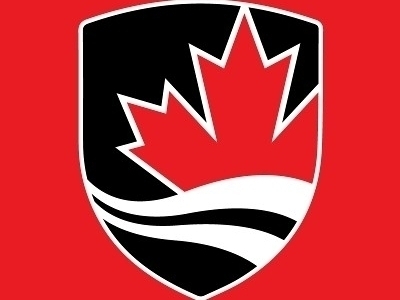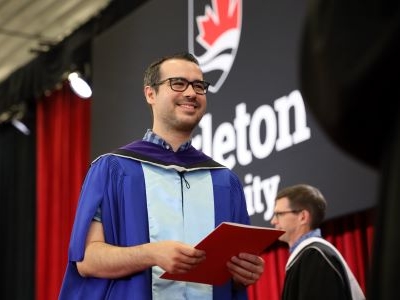On Nov. 26, the Faculty of Graduate and Postdoctoral Affairs, along with Co-op and Career Services, sponsored a Professional Development day to help grad students explore careers outside academia when they graduate. Part of that day included a panel discussion by five Carleton alumni. Here are some of the tips they shared.
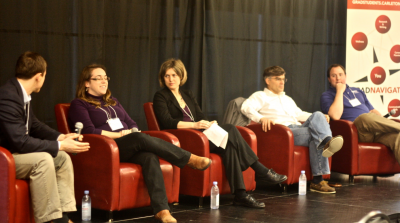
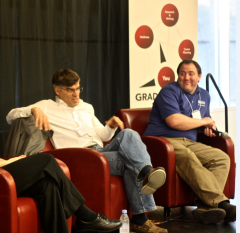
Gord Allan smiles as Rod Story makes a point.
Gordon Allan (PhD/09, Electrical Engineering)
Engineer working at Hittite Microwave
- Be flexible on starting salary and responsibilities. Let the employer know that you are willing to accept their ‘discounted’ view of academic experience for now, but that you will be looking quickly to make up the salary discrepancy once you have proved yourself. Then prove yourself!
- Focus on the practical application of your research and sell it, and your role in it, from that perspective. It can be a far off goal, and you may have only played a small part in it, but anyone will be impressed if ‘you are working to cure cancer’, but may glaze over if you start discussing the details of the expression of the xyz protein at the start.
- Study for every [job] interview as though it was your comps.
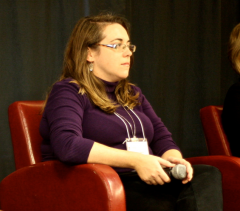
Panelist Lindsay Beaton
Lindsay Beaton (PhD/13, Medical Physics)
Radiobiologist, Healthy Environment and Consumer Safety Branch, Health Canada
- Consider ways of presenting your work in a manner that is approachable and interesting to people who might not be familiar with the field. What makes it interesting and exciting? When networking and chatting with people about your projects, having a few key summary statements about your work can lead to more interesting follow up discussions and new opportunities.
- Ask questions about what people do around you; sometimes it’s hard to know what a job entails from the job title or company alone. Finding out what a job really involves could lead to a much better fit for your skills, and can help you discover new and interesting opportunities you might never before have considered.
- Check out the government procurement website: https://buyandsell.gc.ca/ [for contract work with the government]. It’s a bit daunting, but there’s a page on getting started, and I’d recommend bookmarking a search result for some key words.

Panelist Glen Barber
Glen Barber (MA/13, Economics)
Auditor in the Field of Performance Audit, Officer of the Auditor General of Canada
- My biggest piece of advice would be to find opportunities to participate in conferences, extracurricular activities, and volunteering whenever possible. These activities provide a great avenue for professional networking, but also help develop many of the soft skills related to working in any organization. Simply helping to organize a public lecture or volunteering to support a student initiative can demonstrate many of the core competencies required for most job applications, especially those that may not always be easy to demonstrate from academic work alone.
- The main website for government job applications is www.jobs.gc.ca.
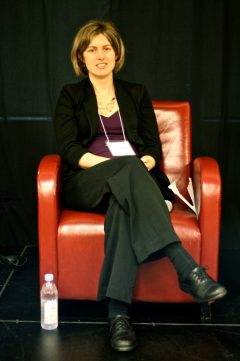
Panelist Jessica Hayes
Jessica Haynes (PhD/12, Canadian History)
Evaluation Officer, Department of Foreign Affairs, Trade and Development Canada
- Keep an open mind. Identify what you like doing from your academic work (research, teaching, etc.) and explore any position or avenue that allows you to do something you like and find important. While I identified during my graduate years that I would like to work in government and contribute to society that way, I did not necessarily focus on what was then CIDA as a likely employment area. But because I was open to the possibility, I found a position which I really enjoy and one that matches well my skills and interests.

Rod Story
Rod Story (PhD/12, Management)
Financial Analyst, Expenditures and Revenue Analysis team, Parliamentary Budget Office
- Besides the obvious method of continuously networking, the other one is discovering how to package your diverse skillset to be of value in the marketplace. I didn’t know the concept of being a data scientist before I started my job search and that my various skills allowed me to do this job. It is through the discussions and interviews that you refine your value proposition. Think of it as both product and market development. Seeing the need and marketing yourself as the solution for it.
- As a PhD graduate you are often viewed as being too specialized, over-qualified, or not practical enough for “real-world” work. It is unlikely the people who might hire you will know how your skills will be useful to them. By presenting yourself as being able to solve a problem which the employer needs solving, you are simultaneously showing them you can think practically and that the skills you have can be of use to them. Also, don’t hesitate to start at a firm as a contractor. Once they see your value, they will often offer you full-time employment. If not, you’ve gained valuable experience that will help in getting your next opportunity.
You may also want to read this 18-part series featuring PhD alumni talking about their personal success stories.
You may want to watch this video from Yvonne Collins (Co-op and Career Services) about how to look for work outside academia.
Monday, November 30, 2015 in Alumni, News, Professional Development
Share: Twitter, Facebook
